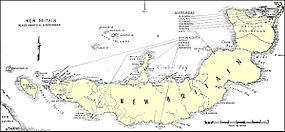New Britain Campaign
| New Britain campaign | |||||||
|---|---|---|---|---|---|---|---|
| Part of the Pacific Theater of World War II | |||||||
 New Britain. Rabaul is at the north-east extremity of the island. |
|||||||
|
|||||||
| Belligerents | |||||||
|
|
|
||||||
| Commanders and leaders | |||||||
|
|
|
||||||
| Strength | |||||||
| < 20,000 | > 100,000 | ||||||
| Casualties and losses | |||||||
| ~30,000 dead, mostly from disease and starvation | |||||||
The New Britain Campaign was a World War II campaign by the Allies, between December 1943 and the end of the war in August 1945, to contain Japanese forces concentrated in Rabaul, the capital of New Britain, the major Japanese base for the New Guinea and Solomons campaigns.
New Britain is a crescent-shaped island north east of the mainland of New Guinea, approximately 600 kilometres (370 mi) along its south-eastern coast line, and from 30 to 110 km (20–70 mi) wide, not including a small central peninsula. The island has an area of 37,800 square kilometers (14,600 mile²).
There were more than 100,000 Japanese military and civilian personnel on New Britain and a smaller nearby island, New Ireland. These were centred on the headquarters of the Eighth Area Army: the 17th Division (11,429 personnel at the end of the war); the 38th Division (13,108); the 39th Brigade (5,073); the 65th Brigade (2,729); the 14th Regiment (2,444); the 34th Regiment (1,879) and the 35th Regiment (1,967). By the end of the war, these Japanese forces were restricted to Rabaul and the surrounding Gazelle Peninsula.
...
Wikipedia
